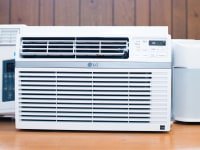All your burning questions about air conditioning answered
It's cool to be in the know
Products are chosen independently by our editors. Purchases made through our links may earn us a commission.
An air conditioning unit is a true modern marvel. Like phones and computers, we use them every day and we know so little about them. Most of the time we don’t need to—if it’s keeping us comfortable, we don’t ask questions. But it’s important to learn the basics, especially when it comes to purchasing a new one and repairing one that’s been chugging along for a few summers.
Who invented air conditioning?
That depends on your definition of air conditioning. Early hunter-gatherers built underground burrows to escape the sun. Ancient Egyptians used evaporative cooling to beat the heat. The Chinese popularized the hand fan 3,000 years ago.
Electric-powered cooling originated in Buffalo, New York, in 1902 when Willis Carrier patented the first modern air conditioner.
How does an air conditioner work?
We should preface this explanation with a quick physics lesson. First, understand you can’t create cold—you can only remove heat. (When you place an ice cube against your skin, the ice is absorbing heat from your body rather than imparting cold.) The second thing to understand is Boyle’s Law, as gas gets compressed, it gets hotter. Finally, know that heat always has to go somewhere.
An air conditioner works via three major components: a compressor, a condenser, and an evaporator.
The compressor pressurizes a refrigerant, the fluid that runs throughout the air conditioner. As the refrigerant gets pressurized, it starts to heat up, pulling energy from the room. The hot fluid is pumped to the back of the air conditioner into the condenser.
Here, the refrigerant flows through a long set of coils, where the extra room allows the gas to depressurize and cool. Just as increasing pressure increases heat, lowering the pressure lowers the heat. The heat gets released into the conditioner and blown outside.
Now bereft of heat, the refrigerant is pumped to the evaporator. This is where the cold-feeling air comes out. In addition to cold refrigerant, the evaporator causes water to condensate out of the air. The water is collected and pumped outside. This is why you often hear a dripping noise when an air conditioner is running. As the refrigerant picks up heat from the room, it gets pumped back into the compressor to start the journey all over again.
Does using A/C in the car kill gas mileage?
According to the Department of Energy, it’s more fuel efficient to use air conditioning while on the highway. At high speeds, opening the windows causes more drag. However, cruising around town, you should roll down the windows to save on gas.
What is a good BTU air conditioner for my room?
We looked online at several places and found a general consensus on the optimal BTU to room size. A 150-square-foot room can be accommodated by a 5,000 BTU air conditioner. A 2,700-square-foot home requires a 36,000 BTU unit.
Technically, one BTU, or British Thermal Unit, is the amount of energy it takes to raise one pound of water one degree at sea level. In the real world, BTU is used to describe how much heat an air conditioner can remove in an hour.
A higher BTU isn’t always better. If you like the feeling of cold air moving through the room, then a very high BTU unit might not be for you. A unit that’s too powerful will lower the temperature very quickly then stop, leaving the air still.
Does leaving the A/C on save energy?
The short answer is no. The long answer is very much no. Leaving your A/C on costs more energy and causes undue wear and tear on your unit. This is especially true if no one is home in the middle of the day. You can also save energy and have a cool house by purchasing a smart plug.
On the market for a new air conditioner? At Reviewed, we’ve lab-tested dozens of window units and created a round up of the best air conditioners for the money.


